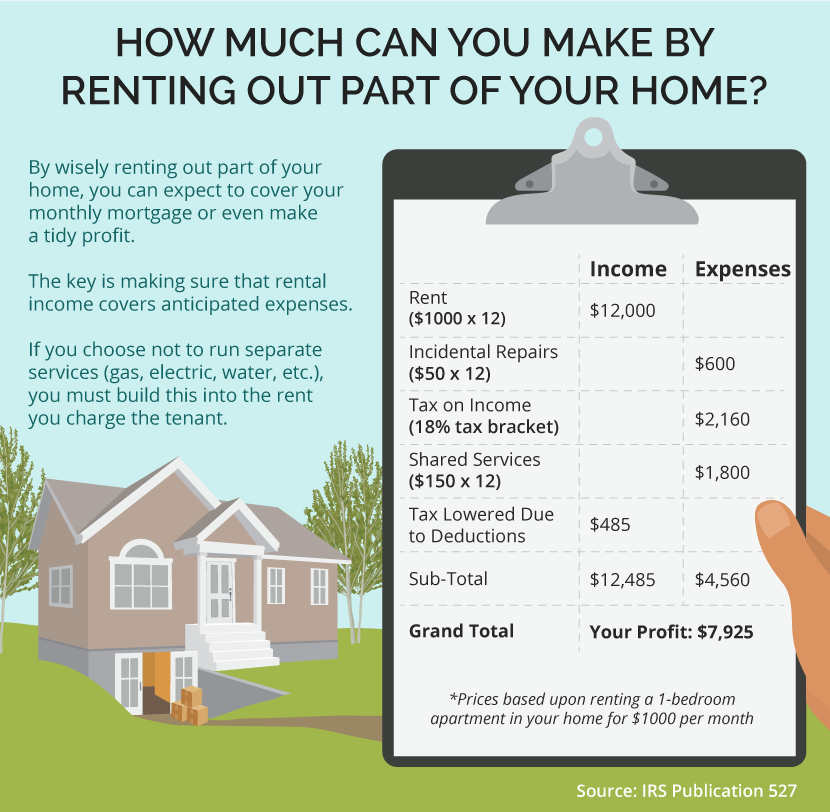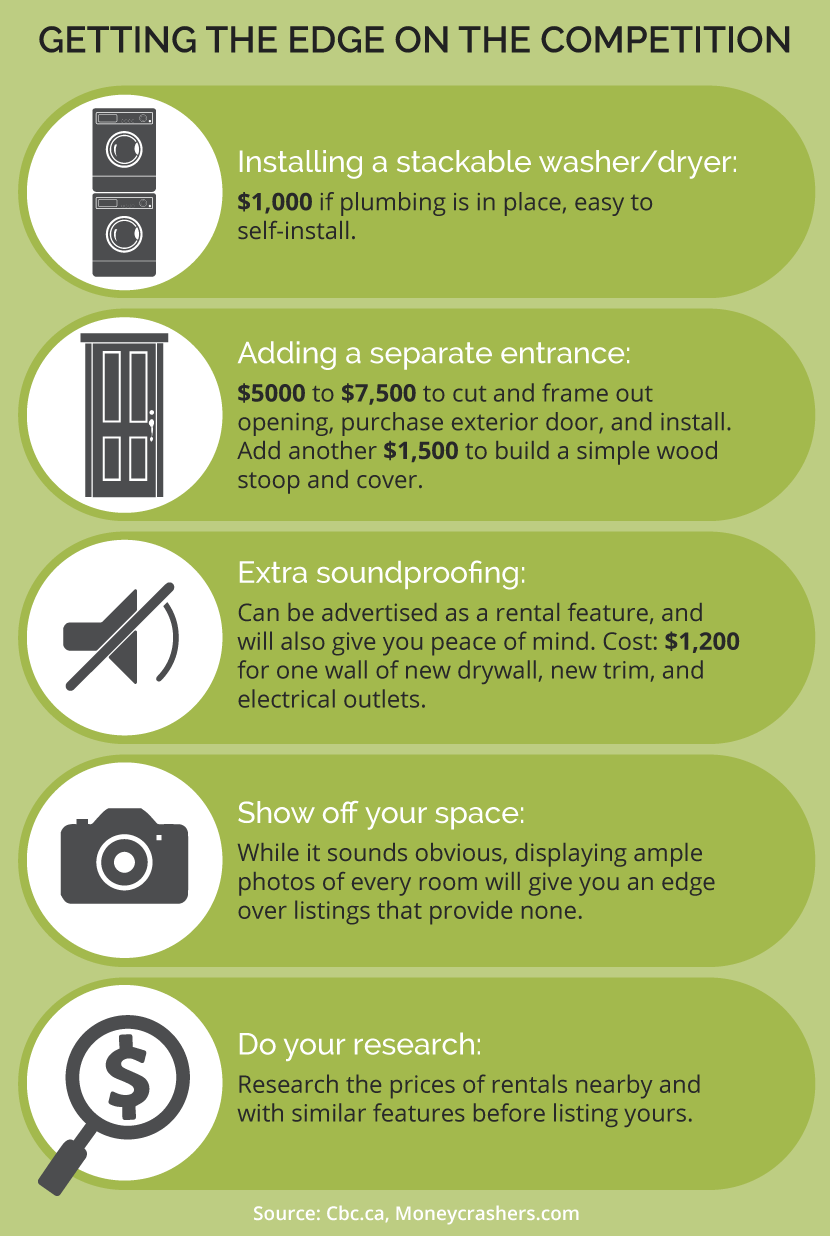Renting Out Part of Your Home
What to Expect for Income and Repairs
You want extra income and you just happen to have extra space in your house. What could be more logical than turning a portion of your home into a small apartment and renting it out?
For owners, wasted space gets used, work is minimal, and income is steady. For renters, conditions are friendlier than living in a massive apartment complex, and housing choices are expanded.
To be clear, this is not simply a bedroom for rent. Instead, a portion of your home is transformed into a fully functioning, independent area with a bedroom, bathroom, sitting room, and kitchenette.
But before you log onto Craigslist to write up a listing, understand all of the implications.
Benefits and Drawbacks
Benefits:
- Extra Money: Income that requires less work on your end than many other businesses.
- Oversight: Living close to your rental property means that you can keep an eye on it. In addition, you have easy access to the property if repairs are needed.
- Tax Benefits: Certain expenses that you would ordinarily bear individually can be shared with the rental apartment.
- Occupied Property: If you frequently travel or are worried about safety as a single person living alone, having other occupants on the property can provide a measure of security.
Drawbacks
- Business Costs: Starting costs associated with turning a raw space into a fully-fledged legal apartment can be more significant than many people realize.
- Legalities: Lulled by the notion that they are simply renting out a part of their home, many people forget that they are subject to a host of legalities, just like any other landlord.
- Taxed Income: While many people may think of the rental income as “extra cash in the pocket,” this extra income is taxable, just like any other small business revenue.
- Damage Affects Your Living Situation: Damage caused by the renter such as an overflowing bathtub or washer will affect your own living area.

How Much Can You Make by Renting Out Part of Your Home?
For many homeowners, rental revenue sufficient to break even on the mortgage is good enough. Others want this, and they want to turn a profit, too.
Building Out the Space
Few homeowners wishing to rent out part of their home already have a space that is rental-ready. In most cases, you will need to make alterations to your property.
- Defined Space: You must have the raw space to begin with – a basement, mother-in-law quarters, garage, etc. Creating the raw space only for the purposes of renting it out may not be cost-effective.
- Full Quarters: It is preferable to provide a full complement of living quarters: a bedroom, bathroom, kitchenette, and living room. Adding a washer and dryer is a good selling point, too. Besides making the apartment more attractive to potential renters, a full quarters apartment will give you more privacy.
- Contractor: The more independent you want the apartment to be, the greater your need for a contractor is. Few homeowners can take on such a project individually. Contractors may charge 15 percent to 25 percent of the project price, so be sure to figure that into your business start-up cost.
- Access: The renter should have separate access so that he/she does not have to pass through your living quarters.
- Services (Electric, Gas, Water, Sewer): Either services are either shared by you and the tenant or you create separate lines to the rental. Separate lines have the benefit of separate metering (called sub-meters), but they can be costly to create. For example, to install a separate meter for your rental, the gas company may require you to bring in a second line from the street – a costly prospect. The great benefit of using a contractor is that he or she can advise you on these matters.http://www.servicealberta.gov.ab.ca/pdf/tipsheets/Sub-meters_for_rental_units.pdf
- Sound: Create soundproofed separation between the apartment and your living area. Doubling up on the drywall is one classic and quick way to limit sound.
- Egress: The rental apartment must have emergency access to the exterior in case of fire.

Taxes: Costs and Benefits
Nearly every owner of a traditional small business is aware of the need to pay taxes. Every small business – a coffee shop, eBay store, tour business, or restaurant – must report income and pay taxes on it.
Many homeowners who rent out a part of their home lose sight of the fact that they, too, are running a small business; the only difference is that the business is located in their own home.
This is not under-the-table income; this is above-board income that is subject to a straight marginal tax rate. For example, if you are in the 20 percent tax bracket and earn $1,000 per month from your rental, you must pay $2,400 per year in taxes.http://www.investopedia.com/financial-edge/0312/how-renting-out-your-spare-room-can-backfire.aspx
But tax benefits can be enticing. One unexpected benefit of renting out a portion of your home is tax deductions. The U.S. Internal Revenue Service (IRS) allows expenses related to the rental portion of your property to be deducted on your annual taxes.https://www.irs.gov/publications/p527/ch04.html#en_US_2015_publink1000219159
Another way to look at it is that extra space in your home that ordinarily would be vacant is not only producing extra income but can share your tax burden. Expenses that can be shared include the following:
- Home mortgage interest
- Qualified mortgage insurance premiums
- Real estate taxes
- Some personal expenses that would normally be nondeductible, such as electricity and painting the home’s exterior.
Expenses that apply only to the rental portion are wholly deductible, such as a dedicated phone line, repairs, decorations, window unit ACs, permanent furniture, etc. As long as it applies only to the rental area, it is 100 percent tax deductible.http://www.nolo.com/legal-encyclopedia/tax-issues-when-renting-out-room-your-house.html
Legalities
Are You Allowed to Rent?
Condo owners may have restrictive covenants. As an owner of a single-family residence, you have no covenants unless a housing association controls your area.
Because of Airbnb, city governments are taking sharper notice of home rentals, even partial home rentals. Some cities have rental registration systems that include occasional inspections. Other cities, in an attempt to limit boarding or rooming houses,
have restrictions on the number of “unrelated” people who may live in the same residence.
Begin with a visit to your city’s housing department to discuss restrictions on partial home rentals.
Fair Housing and Tenants’ Rights
You are bound by fair housing laws, just like any other landlord, meaning that you can specify requirements like no pets or no smoking, but you cannot discriminate on the basis of race or gender.
You will stay in good legal standing if you treat the landlord-renter relationship with the same objectivity and distance as you would if you were renting an off-premises apartment.
For example, if your tenant shows up at your door unannounced to discuss a matter, this is a matter of inconvenience for you that should be defined in the rental contract. But if you were to attempt to improperly enter the apartment, this becomes a legal issue that impinges on the tenant’s rights.http://www.moneycrashers.com/good-landlord-tips-advice-responsibilities/
Taking Care of Repairs: Your Responsibilities
Repairs can be divided into two areas: those you need to do immediately by law and those you need to do within a reasonable amount of time.
In both areas, notice of at least 24 hours must be given, and you can only enter during “normal business hours,” such as Monday-Friday from 9:00am to 5:00pm.
Repairs within 24-48 Hours
By law, you are required to keep the apartment in “habitable condition,” a loose definition that generally means:
- Keeping the building structurally sound
- Providing running hot and cold water
- Providing a safe heat source for climate control
- Keeping the property free of pests and vermin
- Maintaining smoke detectors
Because these are repairs that touch on matters of health and safety, you need to get on these repairs within a day or two.
Repairs within 30 Days
Torn window screens, leaky faucets, unpainted rooms, or constantly running toilets are more nuisances than life-threatening disasters. The “reasonable amount of time” standard for these is usually 30 days.
However, because the apartment is intertwined with your own living space, it is highly recommended that you apply the stricter standard – 24 to 48 hours. After all, water from the slowly draining bathtub in the rental apartment may work its way into your own living quarters.

Are You Up to It? 3 Ways to Make It Work for You
Many homeowners, starry-eyed and tempted by the prospect of “passive income,” find that renting out a part of their home takes an emotional toll that they did not expect.
Because renting out part of your home is an unusual take on the typical landlord-renter arrangement, here are three potential problems you may not have considered – with suggested solutions.
1. Protect Your Own Privacy: What are your “business hours”? Can your tenant knock on your door at 2:00am to discuss the next month’s rent? Specify your privacy arrangements in the rental contract.
2. Manage (or Limit) Common Areas: Because running separate power, water, and sewer lines is prohibitively expensive, most would-be landlords share these services with the renters. Some even share more personal areas, such as the kitchen and laundry room. While you will save money by sharing these services, realize that the trade-off is a loosening of boundaries.http://www.moneycrashers.com/renting-out-room-in-house/
3. Realize That Passive Income May Require Some Work: If you expect your work to end the moment you sign the rental contract, you will be sorely disappointed. Renting out part of your home does require some work. Conditioning your mind to this prospect is vital to making this arrangement a happy and prosperous one for you.
Renting out a part of your home is a great way to make extra income. By keeping in mind start-up costs as well as monthly expenses, you can ensure that you not only cover your monthly mortgage but turn a profit, too.
Embed the article on your site

